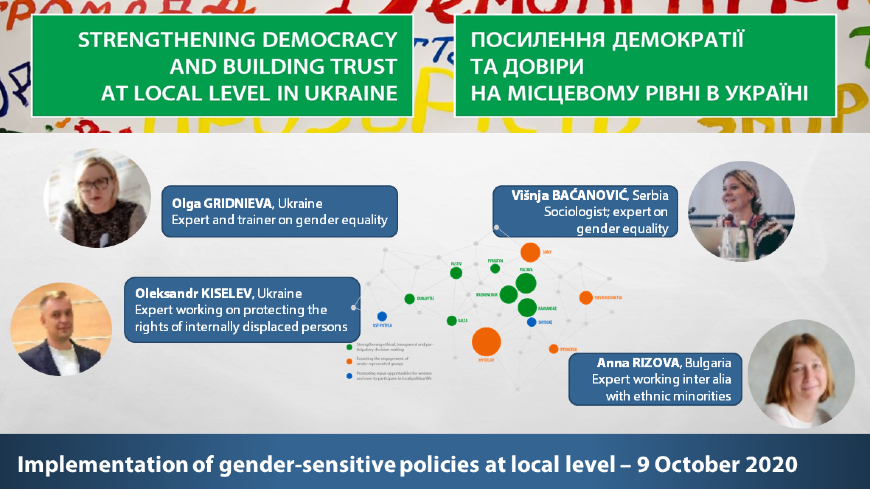On 9 October 2020, more than 40 Ukrainian elected representatives and civil servants, subject-matter experts and members of the Association of Ukrainian Cities participated in the webinar “Implementation of gender-sensitive policies at local level”. The event was part of a series of thematic webinars scheduled between 9 and 16 October 2020, which aimed at heeding current precautionary measures derived from the COVID-19 pandemic as part of the local initiatives being implemented in 13 Ukrainian municipalities.
Through this event, the Congress continues to provide support to Ukrainian municipalities in fostering open, transparent and participatory local decision-making, as well as improving the engagement of under-represented groups and promoting gender equality. Municipalities for their part were able to discuss COVID-19 related challenges encountered in the development and implementation of local initiatives (i.e. budget cuts, communication, reaching out to underrepresented groups) and provide ideas for targeted solutions through best practices.
Tetyana Antonenko, Secretary of the Working Group on Gender-Sensitive Budgeting of the Municipality of Shyroke (Zaporizhya oblast), presented an initiative which integrates a gender-balanced approach into local educational programmes for children. By studying the distribution between girls and boys attending educational programmes in various fields and analysing the data through a gender-sensitive approach, Shyroke was able to address gender-related issues among its population.
Nataliya Deviaternikova, Chief Specialist of the Municipal Infrastructure Department of the Municipality of Primorsk, (Zhaporizhia oblast) presented an initiative to make participatory budgeting more inclusive for all the local communities. A needs assessment on community and institutional capacities is being developed in order to identify the most urgent and core changes to be made. Similarly, a monitoring and evaluation plan of the participatory budgeting scheme is being established to identify obstacles and adjust the planning and implementation of the budget accordingly.
Finally, Alisa Stoyanova, representative of Mykolaiv City Council, explained how training courses aimed at enabling women to set up their own business in tourism helped participants establish 22 guided city tours that are now available for tourists.
Together with experts, webinar participants identified two best-applicable approaches to be taken into consideration when defining gender-responsive measures: special funding where one gender is underrepresented (e.g. shelters for women or support to victims of gender-based violence) and mainstreaming gender into programmes and strategic objectives related to sports, education, economic development and safety.
The webinar was organised as part of the project "Strengthening democracy and building trust at local level in Ukraine” implemented by the Congress of Local and Regional Authorities within the Council of Europe Action Plan for Ukraine 2018‑2021. The project aims to improve the quality of local democracy in Ukraine by strengthening institutional frameworks and by supporting local authorities and their national associations in their efforts to promote ethical decision-making and more citizen-oriented, inclusive and transparent local governance.
See also:






